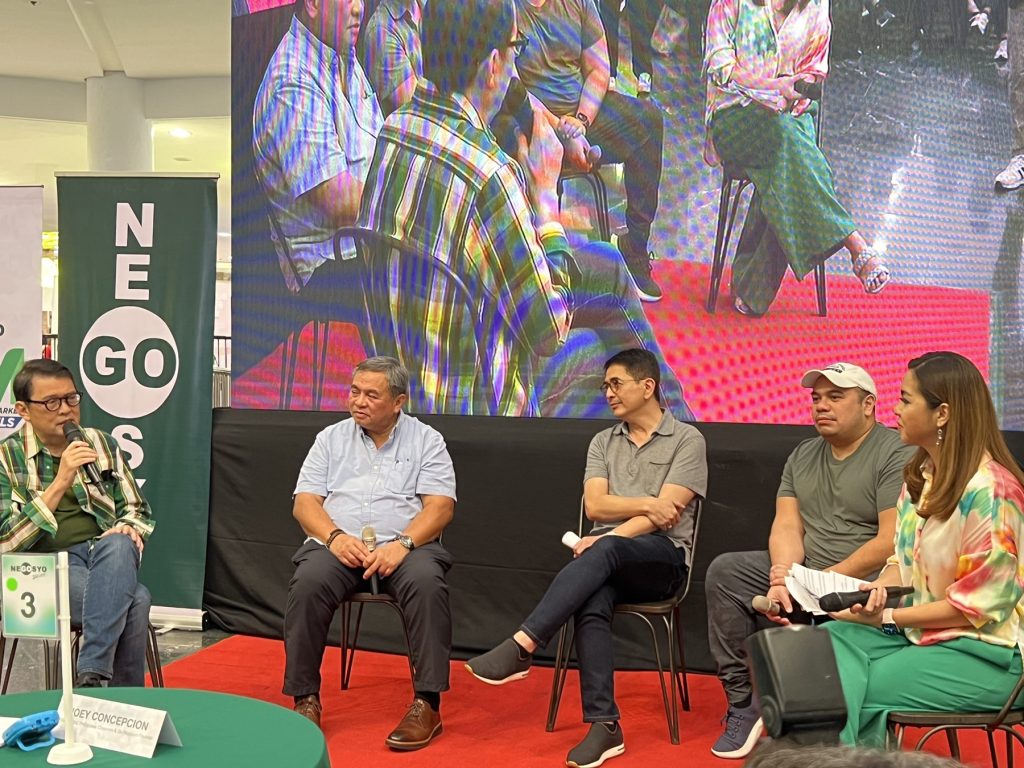
PBBM Notes Japan’s Region-Wide MSME Support Through US$681k Grant
February 13, 2023
Concepcion: Big-Brother Agri Companies Must Help Micro Farmers Compete in RCEP
February 24, 2023
Mentorship is Selflessness in Action
Our entrepreneur mentoring roadshow 3M on Wheels had quite a powerhouse cast of mentors last Saturday. Joining us were our guests from the ASEAN Business Advisory Council and the KADIN, the Indonesian Chamber of Commerce: ASEAN BAC chairman Arsjad Rasjid, Bernardino Vega and ??Pandu Siahrir. We were also fortunate to have Christian Moeller on board. He co-founded and now runs Lionheart Farms, a successful agri-enterprise in Palawan that was able to uplift the coconut farmers there using an inclusive, sustainable business model. His model will soon form the basis of our coconut sector program for Kapatid Angat Lahat sa Agri Program, or KALAP.
From my conversations with these gentlemen – all successful businessmen in their own right – they share a common passion for seeing other entrepreneurs move up. In them, I see that “it’s not about my negosyo but your negosyo that I want to see flourish when MSMEs scale up.” They understand that there has to be a massive base of thriving entrepreneurs to support economic development. They see the potential of an enterprise and help bring it to reality.
That they are successful in their own right does not surprise me because I have seen the same qualities in people who head successful businesses. They are well-loved and much respected because they share beyond what is expected. And I am not talking merely of charity. They share their knowledge, their time, their resources so that others, too, can have a chance to help others when it’s their turn.
I have always asserted that when the micro becomes small and the small becomes medium, the entire economy will do well because of the jobs that will be created. This has become a mantra now, especially that things are starting to get going for the Philippines.
During our official visits and meetings with foreign investors, we get to know the MSME situation in these countries and confirm the indispensable role of small enterprises in propping up an economy.
Japan, for example, is the land of industrial giants, yet almost all its enterprises are made up of SMEs. They have few micro enterprises because they manage to scale up the ladder. What you get is a vibrant economy that has, despite all the turbulence it experiences, bounced back and remains one of the most active in the world.
I believe this is the challenge for us: Our micro enterprises have to be scaled up to make our growth faster.
Fortunately, we have in our country a growing wave of support for our MSMEs. Government agencies have taken to heart their walking orders to facilitate ease of doing business, and it is working. At our mentoring sessions, rarely do we encounter entrepreneurs complaining about how difficult it is to fulfill the regulatory requirements. Pro-active LGUs take it upon themselves to automate business processes and remove bureaucratic red tape so that their local enterprises can thrive.
The most common concern among entrepreneurs remains to be access to capital. This has become especially true following the pandemic. Many MSMEs were hit by the pandemic and were not able to recapitalize, and many of them do not have assets to secure loans. These are the ones who have already proven that they can and are willing to start their own businesses; we have to help them get back on their feet.
That is why mentoring is so important. Small entrepreneurs are bursting with ideas and have the drive to succeed. What they need is guidance on how to articulate these ideas into a business plan that they can present to a financing institution. Business loans need a solid plan in order to be approved; that’s only a fair exchange.
Another way to help the MSMEs is to give them the support of a large “big brother” corporation. This is our idea behind Kapatid Angat Lahat. As the MSMEs are integrated into the value chain of large corporations, they benefit not just from the mentoring and ready-made market of their big-brother counterparts, they also get a solid backing that can raise their chances of securing loans for their businesses.
Agripreneurs, especially, need this kind of assistance. Agriculture is a capital-intensive business. I do not pretend to be an agri man, but I can see where the problems are. The bulk of our micro entrepreneurs come from the agriculture sector, and they are in the provinces. Unless they find strength by banding together as cooperatives and working with integrators, they will continue to live the hand-to-mouth existence that has kept so many of our countrymen in this cycle of poverty.
During our events, it never fails to amaze me how many people come to be mentored, or at least have a chance to win some money to use as capital for their businesses. They come from all over and from as far as neighboring provinces. When we first resumed our in-person 3M on Wheels free entrepreneurship mentoring sessions at the Ayala Mall at the Manila Bay, we had participants coming all the way from Baguio. We regularly have participants coming by bus from Bulacan, Cavite, Laguna and even Quezon.
You immediately see right there how much potential we have to grow as a country if we tapped into this resource of willing, industrious and driven Filipinos who have the capacity to form that strong, massive base for our economic development.

2/F RFM Corporate Center, Pioneer cor. Sheridan Sts. Mandaluyong City, Metro Manila, Philippines

